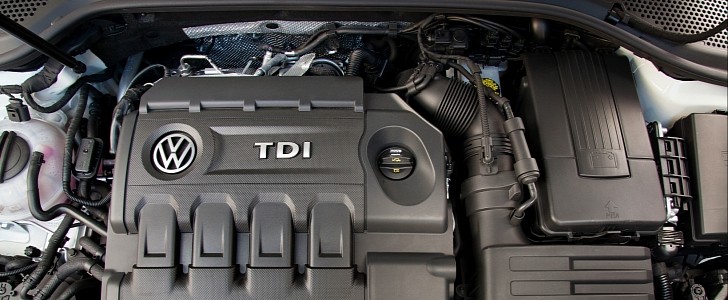Volkswagen promises significantly cleaner diesel engines by using regenerative diesel fuels. The CO2 emissions can be reduced by a whopping 95%. No word on the NOx emissions, though.
The company responsible for the Dieselgate scandal that sealed the fate of the diesel engine is also trying to make up for its blunder with an all-out electric offensive. The diesel engine, although doomed, is still valuable in some segments of the market, for larger SUVs and other utility vehicles. This is why we appreciate Volkswagen announced that their latest generation diesel engines permit the use of regenerative fuels, like paraffinic fuels for instance.
According to Volkswagen, these newly developed diesel fuels containing bio-components permit significant CO2 savings of 70-95% compared with conventional diesel fuel. As such, all Volkswagen models with four-cylinder diesel engines (also known as TDI engines) delivered since June 2021 are approved for operation with paraffinic diesel fuels. This makes it possible for Volkswagen customers throughout Europe to significantly reduce their CO2 emissions as soon as these fuels will be locally available.
Paraffinic fuels are produced from biological residual and waste materials such as HVO (hydrotreated vegetable oil), for example. These vegetable oils are converted into hydrocarbons by a reaction with hydrogen and can be added to the regular diesel fuel in any quantities. They can also be used in their pure form, however.
Biofuels such as HVO are already available on the market, and their share could likely increase to 20%-30% in the energy market for road transport in Europe within the next ten years. Also, the regular diesel that is sold through petrol station networks usually contains paraffinic diesel in various proportions. These include Shell V-Power Diesel, OMV MaxxMotion Diesel, and Aral Ultimate Diesel.
We’re glad Volkswagen thinks of novel ways to extend the diesel engine’s life. Although responsible for deadly NOx emissions, the diesel engine is still hard to replace in heavy-duty applications. Nevertheless, the new paraffinic diesel fuels only take CO2 emissions into account, and not the more problematic NOx emissions. These are impossible to avoid even in hydrogen-fueled combustion engines, as nitrogen makes up for a sizeable 72% of the air used to burn the fuel.
According to Volkswagen, these newly developed diesel fuels containing bio-components permit significant CO2 savings of 70-95% compared with conventional diesel fuel. As such, all Volkswagen models with four-cylinder diesel engines (also known as TDI engines) delivered since June 2021 are approved for operation with paraffinic diesel fuels. This makes it possible for Volkswagen customers throughout Europe to significantly reduce their CO2 emissions as soon as these fuels will be locally available.
Paraffinic fuels are produced from biological residual and waste materials such as HVO (hydrotreated vegetable oil), for example. These vegetable oils are converted into hydrocarbons by a reaction with hydrogen and can be added to the regular diesel fuel in any quantities. They can also be used in their pure form, however.
Biofuels such as HVO are already available on the market, and their share could likely increase to 20%-30% in the energy market for road transport in Europe within the next ten years. Also, the regular diesel that is sold through petrol station networks usually contains paraffinic diesel in various proportions. These include Shell V-Power Diesel, OMV MaxxMotion Diesel, and Aral Ultimate Diesel.
We’re glad Volkswagen thinks of novel ways to extend the diesel engine’s life. Although responsible for deadly NOx emissions, the diesel engine is still hard to replace in heavy-duty applications. Nevertheless, the new paraffinic diesel fuels only take CO2 emissions into account, and not the more problematic NOx emissions. These are impossible to avoid even in hydrogen-fueled combustion engines, as nitrogen makes up for a sizeable 72% of the air used to burn the fuel.






